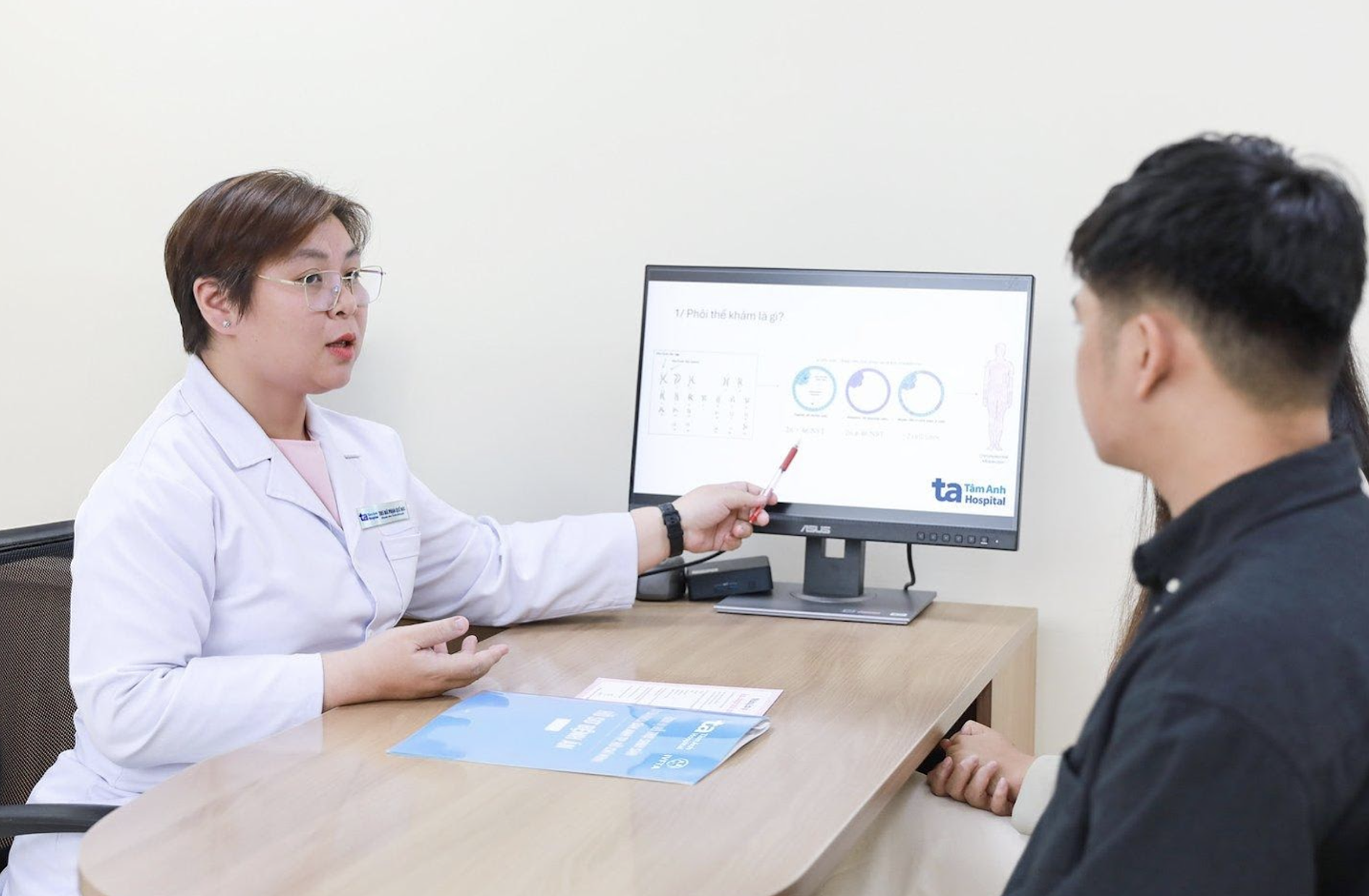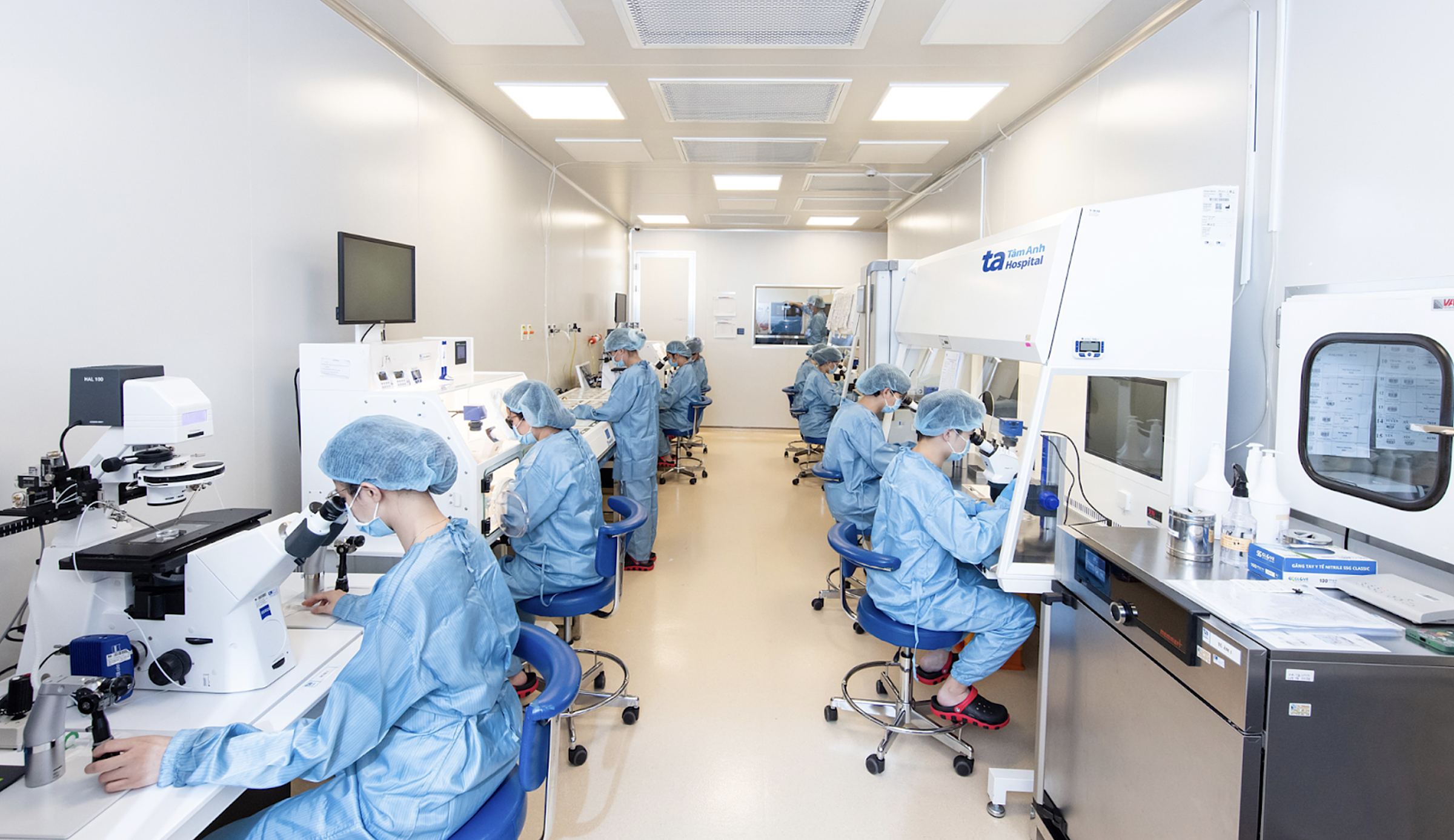Thao, 26, had a previous pregnancy terminated due to fetal abnormalities. Subsequent in vitro fertilization (IVF) treatments were unsuccessful because the embryos couldn't be sustained to day 5. The couple then sought help at the Fertility Center, Tam Anh General Hospital in Ho Chi Minh City (IVF Tam Anh). Initial chromosome testing didn't reveal any significant numerical or structural abnormalities. However, advanced microdeletion and microduplication testing on all 24 chromosomes, with a resolution of up to 400 kb, revealed a small deletion and duplication on Thao’s chromosome 18.
"This was the cause of the fetal brain defects that led to the termination of the previous pregnancy," said Ma Pham Que Mai, a genetic counselor at IVF Tam Anh.
Doctors investigated whether this chromosomal abnormality was isolated or hereditary. Thao's brother, who has intellectual and motor developmental delays, brain abnormalities, and a narrowed heart valve, underwent genetic testing. The results showed he carried the same chromosomal abnormality, though Thao was fortunate to have better overall health.
 |
Ma Pham Que Mai counsels a couple carrying a genetic disorder. Photo illustration: Thanh Luan |
Mai explained that Thao had a 50% chance of passing on the genetic disorder to her children, primarily affecting brain development and causing intellectual and motor delays. To mitigate this risk, at IVF Tam Anh, the husband's sperm was carefully selected and injected into the wife's egg cytoplasm to improve fertilization. The embryos were cultured in a time-lapse incubator, optimizing conditions for development to the blastocyst stage on day 5 for pre-implantation genetic testing. According to Mai, day-5 embryos have undergone natural selection, leading to higher implantation rates and greater IVF success.
The couple had 4 high-quality day-5 embryos. They then waited two weeks for the screening results. Day-5 embryos have about 100-200 cells. Embryologists extracted 5-10 cells from the part that would develop into the placenta for genetic testing. Two embryos were found to have the same chromosomal abnormality as Thao and her brother. Thao is currently preparing her uterine lining for embryo transfer to optimize the chances of a successful pregnancy and a healthy baby.
Vietnam records approximately 40,000 children born with genetic disorders annually. Many recessive genetic disorders don't manifest in parents but severely affect their children. Additionally, many cases arise from spontaneous mutations. Mai explained that fetuses with severe genetic disorders have low survival rates, often resulting in early miscarriages or failed embryo transfers in IVF. Those who survive are born with severe physical and intellectual disabilities and have shorter lifespans. Children with abnormalities in smaller chromosome segments may survive but can experience moderate to severe health issues.
Currently, most genetic disorders and mutations have no cure. About 10% of rare diseases related to these conditions have treatments, but diagnosis and treatment are challenging and expensive. "Therefore, IVF screening is crucial," Mai emphasized, adding that this method helps ensure healthy births and improves the quality of future generations.
 |
The "lab-in-a-lab" clean room system with ISO 5 standards at IVF Tam Anh. Photo: Nguyen Thang |
Giang Huynh Nhu, director of IVF Tam Anh, added that couples with recurring miscarriages, a history of pregnancies or children with birth defects, or multiple failed embryo transfers undergo genetic screening and counseling. Depending on the case, doctors conduct in-depth examinations not only of the couple but also of family members, including parents, grandparents, and, most importantly, siblings or children.
Day-5 embryo culture and pre-implantation genetic testing techniques can screen for over 6,000 genetic disorders that cause birth defects and disabilities, including Edwards syndrome (chromosome 18 abnormality) and Down syndrome (chromosome 21 abnormality). Early detection allows for the selection of embryos without genetic abnormalities for transfer, reducing the risk of passing on genetic disorders, and increasing the success rate of conception, especially in older women. This approach achieves a nearly 70% success rate for healthy births in these cases.
Hoai Thuong
*The patient's name has been changed.
| At 8 p.m. on 19/8, the online consultation program "Modern techniques to help couples with genetic disorders have healthy children" will be broadcast on the VnExpress and Tam Anh General Hospital Facebook pages. IVF Tam Anh experts participating include: Giang Huynh Nhu, director of the center; Ma Pham Que Mai, genetic counselor; and Duong Quang Huy, head of the Andrology Unit. Readers can submit questions here. |












